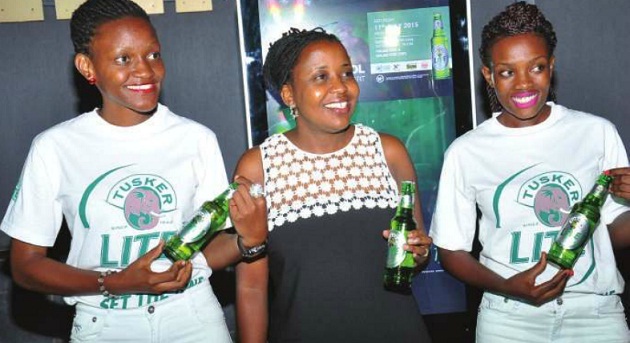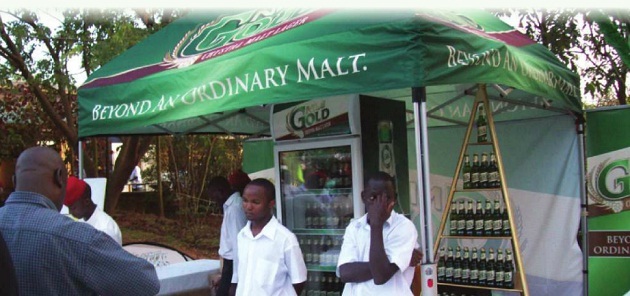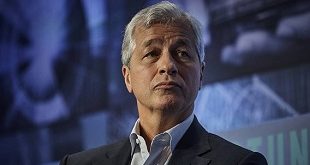Albert Einstein once said, “Imagination is more important than knowledge. For knowledge is limited to all we now know and understand, while imagination embraces the entire world, and all there ever will be to know and understand.” Basing on this, it is imagination that drives many companies and businesses as they create slogans to make their brands more visible and position their products on the market. For any product to have a niche in the market, it must be accompanied with a catchy phrase to popularise it to the masses, writes Ian Katusiime.

How a slogan can shape a company’s image
Belinda Namutebi who is the Chief Brand Custodian at iBrands, a communications agency, says the slogan comes from the story of the product and what the producer/manufacturer is trying to create.
“The slogan is the link that holds a customer and a service together. WithMTN’s ‘everywhere you go’, it was very functional because they were rapidly expanding their network, there was an MTN outlet in every radius of 25km, a shop or care centre”.
Namutebi says a slogan should be well thought out to ensure it resonates with the audience such as Nike’s ‘Just Do It’ which sort of urges athletes to go on and unleash their energy and power. Nike, a sports kit manufacturer is one of the most highly valued and successful brands today. She says the essence of the slogan is to align the product with the audience.
In Uganda, a number of companies have distinguished themselves courtesy of their unique slogans which are quite popular with customers. Roofing’s ‘Strength of a nation’ Club beer’s ‘Tastefully different’, Picfare Industries; ‘simply the best’, Sadolin’s ‘colour your world’ and Total ‘You know where to turn’ are examples of some catchy slogans in Uganda.
Sometimes company slogans can appeal to people individually through their short and simplified messages. Usually when companies strategise for their brands, their aim is to strengthen their relationships with the customers and this is usually successful when the slogan speaks directly to someone buying a product.
Benjamin Rukwengye, a trader was once struck by the slogan of a shoe company. It went like this: ‘I will heel you, I will save your sole, I will even dye for you”. Though it was quite a mouthful, he says it appealed to the shoe lover in him. Rukwengye also says “I find “One Uganda, One People”, the slogan by Uganda’s opposition party, FDC, quite powerful as a slogan because of the aspirational power it represents for the country.”
According to him, many Ugandans, just like himself, are not really drawn to slogans and they do not think much about them.
“Ordinarily, what you do should represent the sloganeering that you so often do but people just put these things up and they end up sounding empty because they never live up to them”.
Rukwengye, who is part of 40/40, a youth-run charity organisation says they chose Mahatma Gandhi’s “Be the Change you want to see” because the organisation was set up to advocate for community participation in resolving challenges.
“Our work is intended to get people to take action if they want to see change”, he says. So what then makes a good slogan? Is it the simplicity, length of the phrase, its ability to connect with customers or the way it rhymes?
Patrick Oyulu, who once worked as a brand executive says a slogan must define a product or service and sway perceptions not only towards uptake of the brand but also to ensure people identify with it.
“A good slogan should be informed by insights about your product. It should not mimic a rival brand. It should be short, relevant, to the point and I must add ‘KickAss’.
It is not unusual for companies to duplicate each other’s brands and sometimes this happens when slogans are xeroxed.
Wizarts Media, a production company in Kampala is contemplating legal action against Urban Television over copying the slogan for its news programme. The slogan under contention is “PMLive”.

Some companies have made their slogans as short as possible but still relevant and catchy. Centenary Bank, which is renowned for its affordability among the low income earners has its slogan as ‘Our Bank’. DFCU Bank, has ‘with pleasure’ Stanbic Bank goes with ‘Moving Forward’ all short but with the ability to communicate the relevant messages to their customers. But long can also be catchy; like Crane Bank’s `Serving to Grow and Growing to Serve”.
Relevance is crucial and is dependent on your target audience or market, Oyulu says. “You cannot have a slogan that is too elitist for a low end audience for example. So you should have factored in segmentation when researching or pretesting your product. If you are just planning a launch, or if it is established and you want to refine it, insights from them should inform your direction”.
To follow Oyulu’s example, a company selling oil lamps cannot have a slogan like ‘illuminating you’ considering that majority of those who purchase the items are people living in rural areas without electricity.
Oyulu explains that the brand position is also significant.
“Where is your brand? Market leader, second, third, fourth or last should really make sense when you are trying to come up with slogans, tag lines etc. Bottom line: research and be very creative”.
Need for change Some companies’ slogans have changed over time reflecting the different cycles the product is going through, the needs of the customers and in some circumstances, due to change of ownership. When Airtel was still trading under the Celtel brand, it used ‘making life better’. When it rebranded to Zain in 2008, it traded with ‘Awonderful world’ and its last change of brand in 2010 toAirtel, it was The ‘Good life’.
Most recently, the company slogan was rebranded to ‘The smartphone network’ to match the popularity of the smartphone.
Namutebi says companies have product cycles for growth just like human beings depending on market responses and the desire to connect with new customers. “As you grow, you keep on changing depending on the different experiences you are exposed to. Companies like Coca Cola are over 125 years old so they keep changing because theirs is a mature brand.”
Namutebi says companies have to be versatile, for example, when dealing with a youthful population as your brand is aging. According to Namutebi, since the slogan is the lifeline of the company, employees should be involved in the creation of the slogan since they are the first advocates and foot soldiers of the brand. Coca-Cola has had 47 slogans in its long history as a global brand. Starting with ‘Drink Coca-Cola in 1886, it has also used ‘The Coke side of life’ and its current one ‘Open Happiness’.
Adrian Kuria who runs a snack delivery business is a fan of the Coke drinks and says the soft drink maker has always had timely slogans. “And also LG which uses ‘Life’s Good’. I have always appreciated LG products that is how I relate to LG”.
Kuria, is a regular goer to KFC, a fast food restaurant known for its chicken and he says their slogan ‘It’s finger lickin’ good’, speaks for itself. Many brand executives agree that a slogan works best when it interacts with the public and they say companies should take advantage of the information age, specifically social media to increase their clientele.
Timothy Luzinda, a brand manager for Mirinda says the soft drinks’ ‘Free your fun side’ is a depiction of the company stands for; fun, excitement and entertainment. “Globally, that’s what the brand represents”.
Some of the most successful brands across the world have also had the most iconic slogans. For example; Apple’s “Think different”, Sony “Make believe” Red Cross “The greatest tragedy is difference”. However it does not always go right with slogans as some have turned out to be public relations disasters.
In September 2015, Volkswagen in its partnership with Audi in North America came under fire for cheating emissions tests by designing software to pull off the feat. Ironically, their slogan was “Truth in Engineering”. In the wake of the scandal, the CEO of Volkswagen resigned.
Google was also forced to rebrand from “Don’t be evil” recently after the slogan had become an easy target for criticism for being negative and misleading. Some suffered backlash due to differences in literal translation.
KFC’s finger lickin’ good, in China, was interpreted as “eat your fingers off” which is considered rude while American Airlines using ‘Fly in Leather’, was interpreted as “fly naked” in Spanish-speaking Mexico.
 The Independent Uganda: You get the Truth we Pay the Price
The Independent Uganda: You get the Truth we Pay the Price


